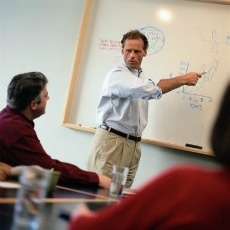This is an era of rapid transformation and heightened opportunities for Faculty Development Centers (FDCs). There is a growing realization that faculty development can be a crucial component in addressing some of the most significant challenges facing higher education, including technology’s impact on teaching, reliance on part-time and distance faculty, and student success.
Read more ›CURRENT ARTICLE • September 15
OTHER RECENT ARTICLES
We’ve all been in the classroom when our lessons flop, our students get restless, and we feel like captains of a sinking ship. I claim that all teachers have bad days, but the best teachers are the ones who can learn from their mistakes. In this piece, I will reflect on a bad teaching day and what I learned from it. I will encourage you to take a reflective approach to your own teaching for your students’ benefit and for your professional development.
Read More ›With part-time faculty now the majority of instructors at most higher education institutions, it’s important to provide them with the support they need to succeed. But what kind of support do they find most useful? The answer to this question can help administrators meet adjuncts’ needs and make the best use of limited resources.
Read More ›Developing a Framework for a Customized Faculty Development Evaluation Plan
Faculty development programs exist, at least to some degree, to help faculty become better teachers, better scholars, and better members of the campus community. Schools invest in faculty development in different ways and at different levels. Yet increasing calls for accountability in higher education are demanding evidence of return on investment. In other words, colleges and universities that are spending time, money, or other resources on faculty development need to determine and show what is working—and improve or abandon what isn’t. Hence the need to evaluate faculty development efforts and to determine their impact
Read More ›From Rusty to Robust: Overcoming the Challenges to Effective Faculty Development
The past 10 years have witnessed some massive growing pains in education. Nearly all aspects at all levels have been touched by efforts to reform in an attempt to create meaningful learning opportunities for today’s students. New tools, skills, approaches, and media have redefined the way we create those experiences, and educators who don’t learn and engage in them will see themselves become increasingly irrelevant. In short, faculty development now more than ever is necessary to an institution’s viability.
Read More ›The longer I teach, the more I see teaching as a highly creative endeavor. Initially, a more mechanical view prevailed for me. In my earlier years as a teacher, I undertook a more formula-like approach by following a behaviorist stance of stimulus-response. If I do X, then my students would do Y, I reasoned. Of course, teaching is never that simple. There are so many intervening factors. And, there is limitless room for alternate ways to address teaching challenges.
Read More ›I would like to be able say of my teaching: this is clearly good; this is clearly not good. I would like to be able to think: I always do things right. I would like to be certain.
Read More ›Magna Publications, the leading provider of professional development resources for the higher education community, today issued a Call for Proposals for the 2014 Teaching Professor Technology Conference to be held Oct. 10-12 in Denver.
Read More › Faculty development has become a priority at many academic institutions as a way to improve the quality of academic programs and to respond to emerging faculty, student, program, and industry needs.
Faculty development has become a priority at many academic institutions as a way to improve the quality of academic programs and to respond to emerging faculty, student, program, and industry needs.
Faculty Respond to the Challenge: Write about Teaching and Learning for Nine Weeks Straight
What does professional development look like? A couple of the more traditional examples might include reading a book, sitting in a room full of educators discussing a particular topic, or traveling to a conference. Certainly, those are all ways we can learn to improve our craft.
Read More ›




